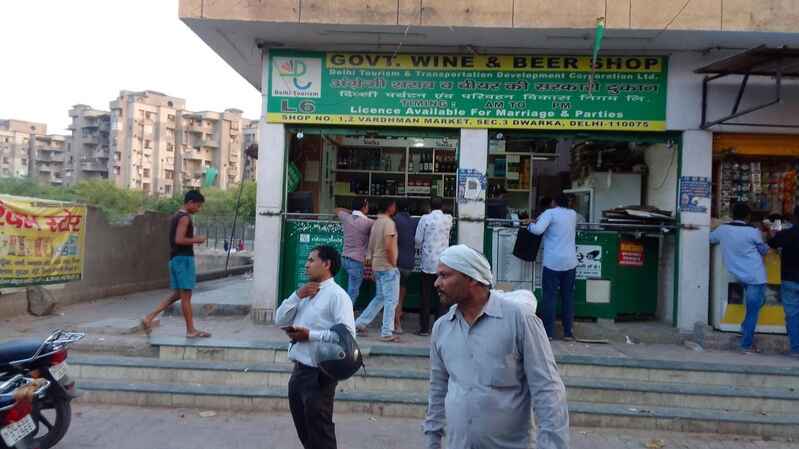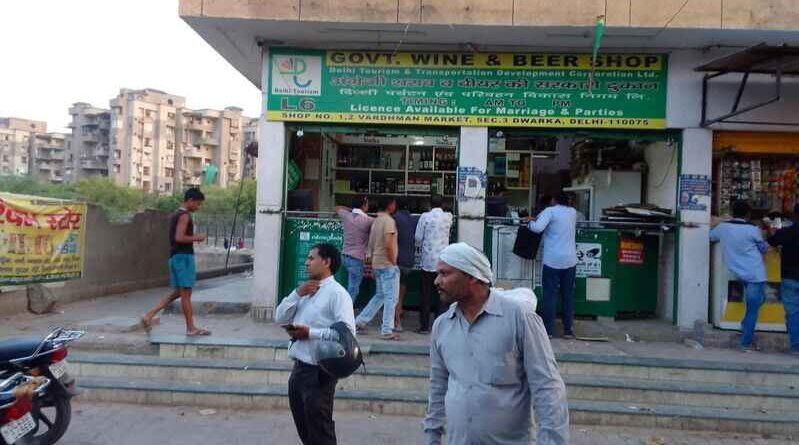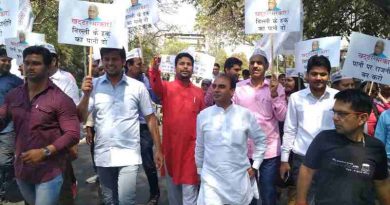Why Courts Are Not Granting Bail to Arvind Kejriwal in Delhi Liquor Scam Case

Why Courts Are Not Granting Bail to Arvind Kejriwal in Delhi Liquor Scam Case
दिल्ली शराब घोटाला मामले में अदालतें अरविंद केजरीवाल को जमानत क्यों नहीं दे रही हैं?
The ED had arrested Kejriwal – who according to ED is the “kingpin” or the key conspirator in the liquor scandal.
By Rakesh Raman
A Delhi court has sent Delhi chief minister (CM) and Aam Aadmi Party (AAP) leader Arvind Kejriwal to judicial custody for 14 days – till July 12 – in connection with corruption charges in the Delhi liquor policy case.
While Kejriwal was already in jail, the Central Bureau of Investigation (CBI) had arrested him on June 26 to interrogate him. After 3 days of custody, today (June 29) Kejriwal has been sent for 14 more days to jail on CBI’s plea.
Kejriwal was arrested on March 21 by the Enforcement Directorate (ED) for his alleged involvement in the liquor policy scandal. Kejriwal was arrested and sent to Delhi’s Tihar jail after he defied nine summonses of ED which had been calling him for questioning in the money laundering crime linked with Delhi liquor policy scam.
With his repeated refusals to appear before the ED, Kejriwal showed that he wants to hide his criminal acts and obstructed the delivery of justice – which by itself is a crime to keep Kejriwal in custody.
Moreover, the ED claims that it has shown sufficient evidence to the courts to prove Kejriwal’s involvement in Delhi liquor policy scam, while his other colleagues – including Manish Sisodia and Sanjay Singh – were also jailed in this case.
In October last year, while rejecting the bail application of Sisodia, the Supreme Court had said there is a possible embezzlement of Rs. 338 crore in the liquor scam case. But the embezzled money has not yet been recovered.
[ Video: क्या अरविंद केजरीवाल को जमानत मिलनी चाहिए? ]
CIRCUMSTANTIAL EVIDENCE
In fact, in such cases of white-collar financial crimes, the recovery of money is not essential to prove a crime. Rather, only circumstantial evidence is required to arrest and incarcerate the accused. And there is sufficient circumstantial evidence to prove Kejriwal’s involvement in the Delhi liquor scam in which crores of rupees have been embezzled.
For example, in the new liquor policy that Kejriwal approved, the profit margin for wholesalers was increased arbitrarily from 6% to 12% so that a part of this commission money (allegedly half of the commission) could come back to Kejriwal and AAP in the form of kickbacks.
While the new policy was supposed to benefit the state government, the ED asserts it resulted in a loss of Rs. 2,631 crore to the public exchequer. In other words, the increased money was siphoned off by Kejriwal and AAP instead of depositing it to the state exchequer.
The ED had arrested Kejriwal – who according to ED is the “kingpin” or the key conspirator in the liquor scandal. The ED alleged that Kejriwal is part of a conspiracy to deliberately leave loopholes in the now-scrapped Delhi excise policy for 2021-22 to benefit certain liquor sellers.
As a result of the dubious excise policy for liquor sales, the state’s revenue dropped to Rs 3,700 crore from Rs 6,300 crore in the previous year, although the Kejriwal government had asserted that the revenue earning will increase to Rs 9,000 crore.
This loss to the state exchequer is a major corruption crime which falls under the grand corruption and rent-seeking categories of white-collar financial crimes in which direct or physical evidence is not required.
In a startling revelation, the ED has also revealed that with the aim to destroy evidence, 140 mobile phones were changed by over 30 persons allegedly involved in the liquor scam of Delhi. It is learnt that Kejriwal is also not giving access to his phone to the investigating agencies.
Obviously, the attempt to change the liquor policy with the intention to cause a loss to the state exchequer – and with the possibility of misappropriation of public money – is a very strong circumstantial evidence against Kejriwal and other AAP politicians.
The destruction of digital evidence is also an obstruction of justice offence for which Kejriwal and his accomplices cannot be released on bail. If any court releases Kejriwal or his accomplices, they can make more attempts to destroy the evidence and influence the witnesses by intimidation or allurement.
COURT JUDGMENT AND AAP CASES
However, with a controversial judgment, Judge Niyay Bindu in a Delhi lower court had granted bail to Kejriwal on June 20. But the next day the ED approached the Delhi High Court which put an interim stay on the trial court’s order.
The ED argued that the trial court Judge Niyay Bindu did not give it proper opportunity to explain the case and termed the order ‘perverse’. As the Delhi High Court did not allow bail to Kejriwal, he approached the Supreme Court on June 23.
After hearing both sides – ED and Kejriwal – the Supreme Court said it will wait for the Delhi High Court’s verdict and posted the matter for hearing on June 26. But when the Central Bureau of Investigation (CBI) arrested and took Kejriwal’s custody on June 26 in the ongoing liquor policy case, he withdrew his bail application from the top court.
The CBI had questioned Kejriwal a day before in Delhi’s Tihar jail where he is imprisoned in the money laundering case linked with the liquor scam. The central agency contended that Kejriwal had approved the liquor policy to benefit a South Group which has allegedly bribed Kejriwal.
The CBI also argued that Kejriwal’s custody is required as he has put the blame of making the shady liquor policy on his colleague Manish Sisodia who is also in jail for the past over a year in the same liquor policy case. Kejriwal denied the allegations. After hearing Kejriwal’s advocate, the court granted Kejriwal’s custody to the CBI until June 29.
Along with Kejriwal, the other AAP politicians whose names appear in the investigating reports of CBI and the ED are Satyendar Jain, Manish Sisodia, Sanjay Singh, and Raghav Chadha.
Kejriwal, Jain, Sisodia, and Sanjay Singh have already been jailed for their acts of corruption. It is expected that an AAP woman politician who loudly spreads lies in the so-called press conferences will soon be called for interrogation by the law-enforcement agencies.
Sanjay Singh – who was also in Tihar jail in the same liquor mafia case – was granted bail on April 2 when the ED did not object to his bail. Although the ED persistently objects to bails in courts, surprisingly the ED did not raise any objection in Sanjay Singh’s case when he sought bail in the court after spending almost 6 months in jail.
Normally, the investigating agencies such as the ED do not oppose bails to the accused if they turn approvers in a case so that the kingpins in the crime could be convicted. The ED already believes that Kejriwal is the kingpin in the Delhi liquor mafia case and immediately after Kejriwal’s imprisonment, the ED facilitated Sanjay Singh’s release on bail.
So, there is a possibility that Sanjay Singh has turned approver and on the basis of crucial information provided secretly by him, the ED could collect substantial evidence to arrest and incarcerate Kejriwal.
Moreover, reports suggest that the ED dragnet will soon extend to more AAP leaders including Atishi, Raghav Chadha, Saurabh Bhardwaj, Durgesh Pathak, and others. Some of these names are already in the files of the ED or CBI.
LIQUOR SCANDAL COMPLAINT IN PUNJAB
Similarly, AAP politicians in Punjab led by CM Bhagwant Mann may be arrested and jailed as the controversial Delhi liquor policy is being implemented in Punjab also.
In November last year, a Punjab Congress leader Navjot Singh Sidhu filed a complaint to the Punjab Governor against the Punjab Government led by Bhagwant Mann.
In his complaint letter, Sidhu raised concerns over the precarious financial situation in Punjab, deteriorating law and order in the state, and lack of accountability in the Bhagwant Mann government.
[ VIDEO: ਕੀ 2027 ‘ਚ ਨਵਜੋਤ ਸਿੱਧੂ ਹੋਣਗੇ ਪੰਜਾਬ ਦੇ ਅਗਲੇ ਮੁੱਖ ਮੰਤਰੀ? ]
The president of the Shiromani Akali Dal (SAD) Sukhbir Singh Badal has also urged the Punjab Governor to hold a probe into the alleged Rs. 500-crore liquor policy scam committed by the AAP government in the state.
It is learnt that the investigating agencies have already started questioning some of the Punjab Government functionaries and AAP leaders to know the extent of corruption in the Punjab liquor scandal.
[ VIDEO: ਕੀ ਸ਼੍ਰੋਮਣੀ ਅਕਾਲੀ ਦਲ ਨੂੰ ਪੂਰੀ ਤਰ੍ਹਾਂ ਤਬਾਹ ਕਰਨ ਤੋਂ ਬਾਅਦ ਸੁਖਬੀਰ ਬਾਦਲ ਜਾਣਗੇ? ]
AAP CORRUPTION CASES
While AAP politicians are apparently involved in multiple corruption scandals, it is expected that some of them named above will soon be behind bars.
In September last year, the CBI launched a preliminary inquiry into alleged irregularities in the construction and renovation of Kejriwal’s house on which the public money in excess of Rs. 45 crore has been squandered. It is a case of misappropriation of public money – which is a serious financial crime allegedly committed by Kejriwal.
Also, on April 2, the ED accused AAP leaders of bribery and corruption in the Delhi Jal Board (DJB) scam, claiming that AAP used the corruption money as election funds. And, on May 6, Delhi Lieutenant Governor (LG) V. K. Saxena ordered a probe by the National Investigation Agency (NIA) to investigate Kejriwal’s links with terror outfits.
Since a number of AAP politicians in Punjab and Delhi are allegedly involved in a series of financial crimes, in May 2024 the ED named the entire Aam Aadmi Party as accused in the liquor scam.
Now, to mislead the public, Kejriwal, his wife, and AAP politicians are falsely blaming PM Modi and his Bharatiya Janata Party (BJP) for Kejriwal’s imprisonment. While courts believe that Kejriwal has a distinct role in Delhi liquor scandal and other crimes, the dishonest AAP leaders are holding protests against Modi and BJP with the help of unknown people who are believed to be hired for protests.
Moreover, it appears that Kejriwal is also paying crores of rupees of public money to some greedy lawyers who try to protect him and other AAP leaders unscrupulously in courts.
The bail cases of Kejriwal or other AAP leaders are listed so frequently in Indian courts that it appears that all the courts are working only to decide AAP cases and the bails for the party’s leaders.
Since Kejriwal is not supposed to spend public money to defend AAP corruption cases, it is a form of corruption that Kejriwal commits in collusion with dishonest lawyers – particularly who belong to the Congress party.
In May 2024, I filed an application under the Right to Information (RTI) Act to know the amount of money being paid for legal services to protect Kejriwal and other AAP leaders in courts. I have not yet received the response.
With their apparent involvement in a number of crime and corruption cases, it will be a travesty of justice if Kejriwal or any of his jailed AAP colleagues are released on bail for the next few years.
In fact, if the courts and investigating agencies probe all the cases diligently, it is possible that Kejriwal and many other AAP leaders will have to spend their remaining lives in jail.
By Rakesh Raman, who is a national award-winning journalist and social activist. He is the founder of the humanitarian organization RMN Foundation which is working in diverse areas to help the disadvantaged and distressed people in the society.
He has also been publishing The Integrity Bulletin news magazine since 2018 to cover local and international corruption issues to engage with different stakeholders who are trying to combat corruption in the world.
In order to inform the Indian citizens and the global community about the extent of corruption in India, he compiled and released in October 2023 a comprehensive research report “India Corruption Research Report 2023 (ICRR 2023)”. It is the second annual report on corruption in India while the first report ICRR 2022 was released in October 2022.
He runs a community-driven anti-corruption social service “Clean House” to help the residents of Delhi raise their voice against the growing corruption and injustice in housing societies where millions of people suffer because of rampant corruption and lawlessness.
💛 Support Independent Journalism
If you find RMN News useful, please consider supporting us.




